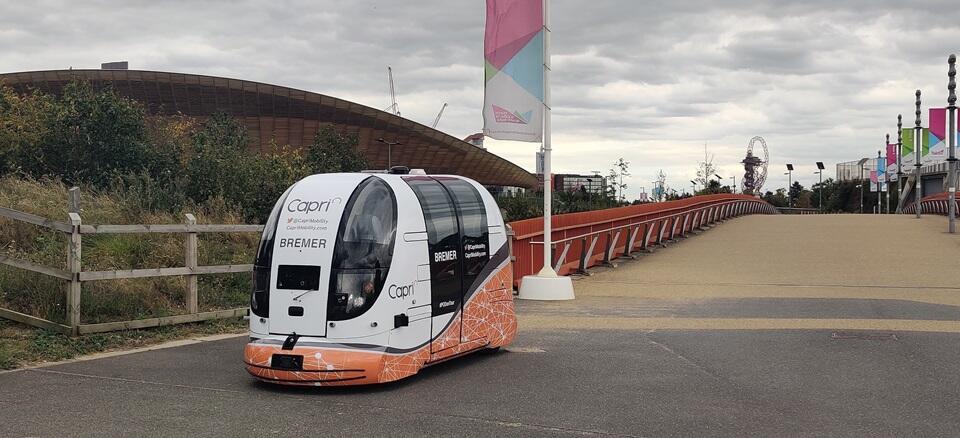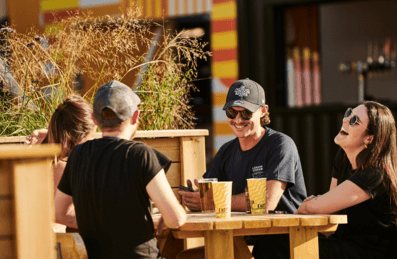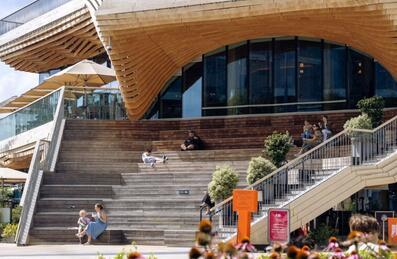
Popular Searches:
Keep up to date
Sign up today for exclusive offers and incredible experiences you won’t want to miss at Queen Elizabeth Olympic Park.
Sign up nowPublic to trial driverless pods at Queen Elizabeth Olympic Park
Public to trial driverless pods at Queen Elizabeth Olympic Park
Press Release 04/09/2019

Driverless pods will transport members of the public around Queen Elizabeth Olympic Park over the next two weeks, with visitors able to test out an innovative mobility service. The trial is part of a research project that is paving the way for the use of connected and autonomous vehicle (CAV) transport services at public transport hubs and around private estates, including tourist and shopping centres, hospitals, business parks and airports.
The AECOM-led Capri consortium is running the trial, which will see two British made pods autonomously operating at the Park. Visitors will be able to book a ride using an app through information marshals located at different stops along the pods’ route. When booking their journey, participants will choose which stop they want to be picked up and dropped off, with the system giving destination instructions to the self-driving vehicles. Simulating an on-demand service, the trial will help support the wider rollout of driverless shuttles in the future.
With Queen Elizabeth Olympic Park already a testbed for smart mobility activity, alongside a wide range of other innovation projects, an important element of this trial will be to assess peoples’ behaviours and attitudes towards driverless pods. With little existing research on how people interact with CAVs in public spaces, representatives from Capri consortium members the University of the West of England and Loughborough University will be observing how people behave when confronted by the pods, as well as surveying passengers who take a ride on them.
Focusing on trips of up to five miles to connect people to places, Capri is developing the next generation of autonomous pods, as well as the systems and technologies that will allow the vehicles to navigate safely and seamlessly in both pedestrian and road environments. A key aim of the project is to develop a business model blueprint to help site owners of large and diverse estates like Queen Elizabeth Olympic Park assess whether driverless shuttles will be viable at their site and how best to invest in this emerging technology.
David Barwell, Chief Executive – UK and Ireland, AECOM, said: “Given the environmental, efficiency and mobility benefits of connected and autonomous vehicles, there are a wide range of potential markets for these types of on-demand services, but significant research is still required to support their future commercial use. Capri is bringing together technical, social and operational research to help the future deployment of driverless shuttles and keep the UK at the forefront of CAV development. Our trial at Queen Elizabeth Olympic Park is a really important milestone for the project, enabling us to test the service with the public at a large and busy site for the first time.”
Lyn Garner, Chief Executive, London Legacy Development Corporation, said: “We are delighted to be hosting this Capri trial. Queen Elizabeth Olympic Park has established itself as a testbed for innovative projects, from technology to sport. Connected and autonomous vehicles will change the face of transport and this is an exciting opportunity to understand the practical implications of this new technology.”
The trial at Queen Elizabeth Olympic Park will be the first public appearance for the Capri pods, which will pick up and drop off passengers at a number of points on a circular route, passing Lee Valley VeloPark, Copper Box Arena, Here East and Timber Lodge Café. Local schools will also be participating, with two engagement days taking place to promote Science, Technology, Engineering and Maths (STEM) activities.
Following this trial, the Capri pods will be at The Mall in South Gloucestershire in early 2020, returning to the Park next year with a final trial that will extend their route and further test the on-demand technology.






